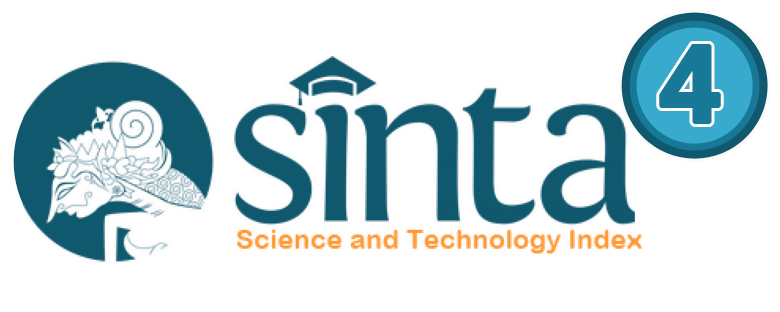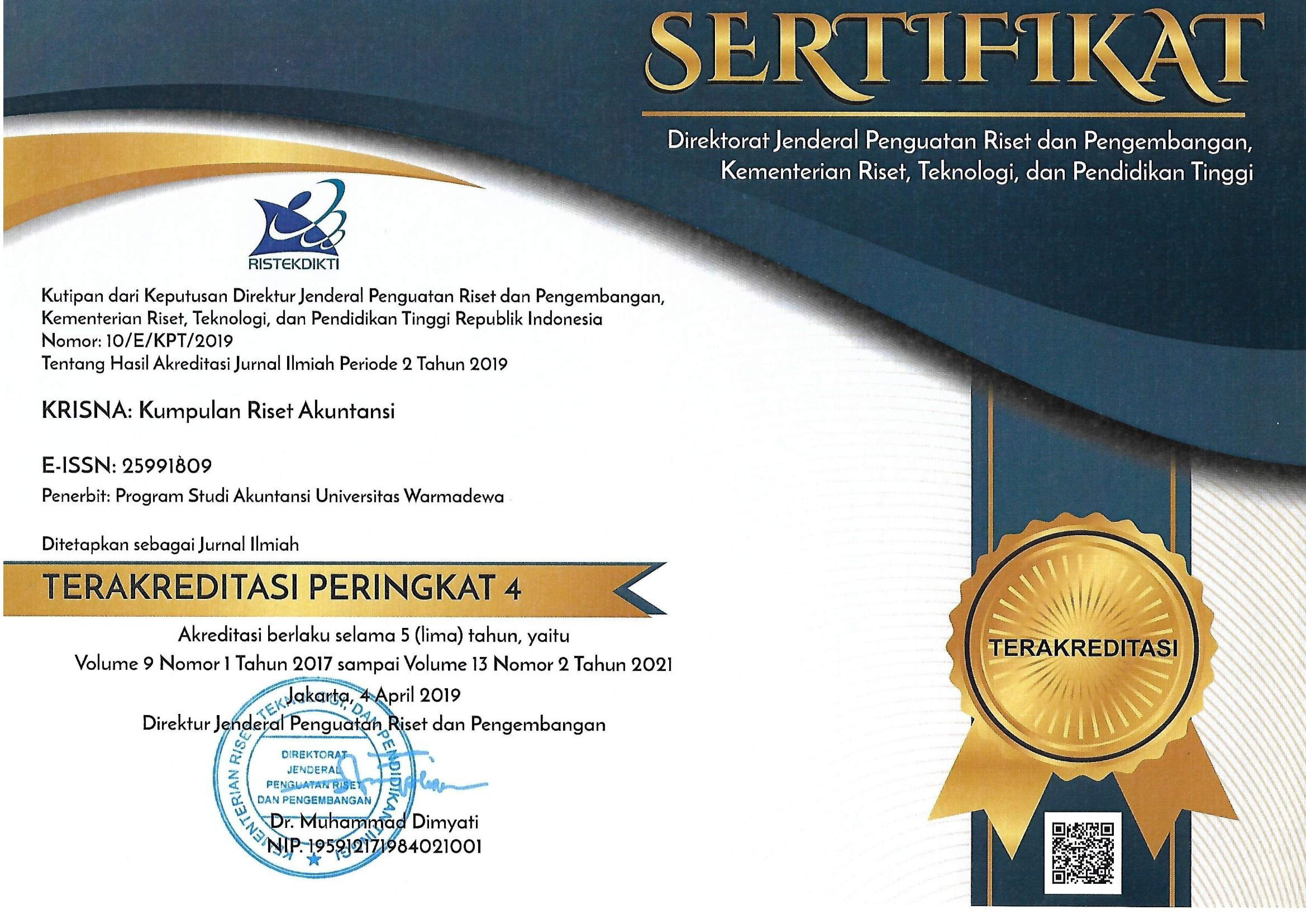SUSTAINABILITY BANK PERKREDITAN RAKYAT DENGAN KINERJA SISTEM INFORMASI AKUNTANSI KEBERLANJUTAN
Abstract
This study aims to examine the development of a sustainability accounting information system based on contingency theory. In today's digital era, BPRs face many data sets, including financial and non-financial data. However, empirical evidence is still scarce on how sustainability issues are linked or integrated into the company's internal information system. The initial data used in this study came from 80 respondents from BPRs in Badung Regency. The results show that there is a significant relationship between stakeholder engagement, especially internal stakeholders, and sustainability accounting information systems; most of the surveyed BPRs include sustainability strategies as core BPR strategies; however, there is no relationship between sustainability accounting information systems and BPR strategies, and firm size does not moderate sustainability accounting information systems with BPR strategies. The limitation of this study relates to the small sample size, which only uses respondents from BPRs in Badung Regency. The results of this study are important to encourage the social responsibility of BPRs by developing a sustainability accounting information system.
References
Adams, C. A., & Frost, G. R. (2008). Integrating sustainability reporting into management practices. Accounting Forum, 32(4), 288–302. https://doi.org/10.1016/j.accfor.2008.05.002
Adams, C. A., Muir, S., & Hoque, Z. (2014). Measurement of sustainability performance in the public sector. Sustainability Accounting, Management and Policy Journal, 5(1), 46–67. https://doi.org/10.1108/SAMPJ-04-2012-0018
Al-Eqab, M., & Ismail, N. (2011). Contingency Factors and Accounting Information System Design in Jordanian Companies. IBIMA Business Review, December, 1–13. https://doi.org/10.5171/2011.166128
Bebbington, J., Higgins, C., & Frame, B. (2009). Initiating sustainable development reporting: Evidence from New Zealand. Accounting, Auditing and Accountability Journal, 22(4), 588–625. https://doi.org/10.1108/09513570910955452
Bebbington, J., Kirk, E. A., & Larrinaga, C. (2012). The production of normativity: A comparison of reporting regimes in Spain and the UK. Accounting, Organizations and Society, 37(2), 78–94. https://doi.org/10.1016/j.aos.2012.01.001
Carroll, A. B. (1995). Stakeholder Thinking in Three Models of Management Morality: A Perspective with Strategic Implications. Helsinki, Finland: LSR- Publications, 47–74. https://doi.org/10.3138/9781442673496-010
Chenhall, R. H. (2003). Management control systems design within its organizational context: findings from contingency-based research and directions for the future. Accounting, Organizations and Society 28, 28, 127–168. https://doi.org/10.1063/1.5024417
Dagiliene, L., & Šutiene, K. (2019). Corporate sustainability accounting information systems: a contingency-based approach. Sustainability Accounting, Management and Policy Journal, 10(2), 260–289. https://doi.org/10.1108/SAMPJ-07-2018-0200
Dewi, P. N. S., Candiasa, I. M., & Dantes, G. R. (2018). Perencanaan Strategis Sistem Informasi/Teknologi Informasi (Studi Kasus: PT. BPR Jaya Kerti). Jurnal Ilmu Komputer Indonesia (JIKI), 3(1), 32–43.
Dillard, J., Yuthas, K., & Baudot, L. (2016). Dialogic framing of accounting information systems in social and environmental accounting domains: Lessons from, and for, microfinance. International Journal of Accounting Information Systems, 23, 14–27. https://doi.org/10.1016/j.accinf.2016.10.001
Dumay, J., Bernardi, C., Guthrie, J., & Demartini, P. (2016). Integrated reporting: A structured literature review. Accounting Forum, 40(3), 166–185. https://doi.org/10.1016/j.accfor.2016.06.001
Epstein, M. J., & Roy, M. J. (2001). Sustainability in action: Identifying and measuring the key performance drivers. Long Range Planning, 34(5), 585–604. https://doi.org/10.1016/S0024-6301(01)00084-X
Fortainer, F., Kolk, A., & Pinkse, J. (2011). Harmonization in CSR reporting MNE and Global CSR Standars. MIR: Management International Review, 51(5), 665–696.
Gond, J. P., Grubnic, S., Herzig, C., & Moon, J. (2012). Configuring management control systems: Theorizing the integration of strategy and sustainability. Management Accounting Research, 23(3), 205–223. https://doi.org/10.1016/j.mar.2012.06.003
Gordon, L. A., & Miller, D. (1976). A contingency framework for the design of accounting information systems. Accounting, Organizations and Society, 1(1), 59–69. https://doi.org/10.1016/0361-3682(76)90007-6
Gordon, L. A., & Narayanan, V. K. (1984). Management accounting systems, perceived environmental uncertainty and organization structure: An empirical investigation. Accounting, Organizations and Society, 9(1), 33–47. https://doi.org/10.1016/0361-3682(84)90028-X
Gray, R. (2010). Is accounting for sustainability actually accounting for sustainability...and how would we know? An exploration of narratives of organisations and the planet. Accounting, Organizations and Society, 35(1), 47–62. https://doi.org/10.1016/j.aos.2009.04.006
Gray, R., Javad, M., Power, D. M., & Sinclair, C. D. (2001). Social and environmental disclosure and corporate characteristics: A research note and extension. Journal of Business Finance and Accounting, 28(3–4), 327–356. https://doi.org/10.1111/1468-5957.00376
Higgins, C., Milne, M. J., & van Gramberg, B. (2015). The Uptake of Sustainability Reporting in Australia. Journal of Business Ethics, 129(2), 445–468. https://doi.org/10.1007/s10551-014-2171-2
Horváth, P., Pütter, J. M., Haldma, T., Lääts, K., Dimante, D., DagilienÄ—, L., Kochalski, C., Ratajczak, P., Wagner, J., Petera, P., PaksÇová, R., Tirnitz, T., Sucală, V.-I., Sava, A., Rejc Buhovac, A., Osmanagić Bedenik, N., & LabaÅ¡, D. (2017). Sustainability Reporting in Central and Eastern European Companies: Results of an International and Empirical Study. Sustainability Reporting in Central and Eastern European Companies: international Empirical Insights, Springer, Cham. https://doi.org/10.1007/978-3-319-52578-5_15
Kerr, J., & Rouse, P. (2015). Sustainability reporting integrated into management control. Pacific Accounting Review, 27(2), 189–207.
Lubis, M. F., Azizah, D., Marayke, I., & Natasyah, N. (2021). Perancangan Sistem Informasi Kelayakan Pemberian Kredit PT. BPR Duta Pakuan Mandiri Cabang Tangerang. Adi Bisnis Digital Interdisiplin, 2(1), 1–11.
Lucianetti, L., Chiappetta Jabbour, C. J., Gunasekaran, A., & Latan, H. (2018). Contingency factors and complementary effects of adopting advanced manufacturing tools and managerial practices: Effects on organizational measurement systems and firms’ performance. International Journal of Production Economics, 200, 318–328. https://doi.org/10.1016/j.ijpe.2018.04.005
Maas, K., Schaltegger, S., & Crutzen, N. (2016). Advancing the integration of corporate sustainability measurement, management and reporting. Journal of Cleaner Production, 133, 859–862. https://doi.org/10.1016/j.jclepro.2016.06.006
Mäkelä, H., Gibbon, J., & Costa, E. (2017). Social Enterprise, Accountability and Social Accounting. Social and Environmental Accountability Journal, 37(1), 1–5. https://doi.org/10.1080/0969160X.2017.1287583
MaletiÄ, M., MaletiÄ, D., & GomiÅ¡Äek, B. (2018). The role of contingency factors on the relationship between sustainability practices and organizational performance. Journal of Cleaner Production, 171, 423–433. https://doi.org/10.1016/j.jclepro.2017.09.172
Manalu, G. S. M., & Yadnyana, I. K. (2021). Penggunaan Teknologi Informasi, Efektivitas Sistem Informasi Akuntansi, Sistem Pengendalian Intern dan Kinerja Karyawan BPR Kabupaten Gianyar. E-Jurnal Akuntansi, 31(2), 309. https://doi.org/10.24843/eja.2021.v31.i02.p04
Morton, N. A., & Hu, Q. (2008). Implications of the fit between organizational structure and ERP: A structural contingency theory perspective. International Journal of Information Management, 28(5), 391–402. https://doi.org/10.1016/j.ijinfomgt.2008.01.008
Narayanan, V., & Adams, C. A. (2017). Transformative change towards sustainability: the interaction between organisational discourses and organisational practices. Accounting and Business Research, 47(3), 344–368. https://doi.org/10.1080/00014788.2016.1257930
Otley, D. (2016). The contingency theory of management accounting and control: 1980-2014. Management Accounting Research, 31, 45–62. https://doi.org/10.1016/j.mar.2016.02.001
Otley, D. T. (1980). The Contingency Theory og Management Accounting: Achievement and Prognosis. Accounting, Organizations and Society, 5(4), 413–428.
Pryshlakivsky, J., & Searcy, C. (2017). A Heuristic Model for Establishing Trade-Offs in Corporate Sustainability Performance Measurement Systems. Journal of Business Ethics, 144(2), 323–342. https://doi.org/10.1007/s10551-015-2806-y
Reinking, J. (2012). Contingency theory in information system researchâ€, in Dwivedi, Y., Wade, M. and Schneberger, S. (Eds). Springer, 28(May), 461. https://doi.org/10.1007/978-1-4419-6108-2
Schaltegger, S., & Burritt, R. (2018). Business cases and corporate engagement with sustainability: Differentiating ethical motivations. Journal of Business Ethics, 147(2), 241–259. https://doi.org/10.1007/s10551-015-2938-0
Schaltegger, S., & Hörisch, J. (2017). In Search of the Dominant Rationale in Sustainability Management: Legitimacy- or Profit-Seeking? Journal of Business Ethics, 145(2), 259–276. https://doi.org/10.1007/s10551-015-2854-3
Shabana, K. M., Buchholtz, A. K., & Carroll, A. B. (2017). The Institutionalization of Corporate Social Responsibility Reporting. Business and Society, 56(8), 1107–1135. https://doi.org/10.1177/0007650316628177
Singh, R. K., Murty, H. R., Gupta, S. K., & Dikshit, A. K. (2012). An overview of sustainability assessment methodologies. Ecological Indicators, 15(1), 281–299. https://doi.org/10.1016/j.ecolind.2011.01.007
Soderstrom, K. M., Soderstrom, N. S., & Stewart, C. R. (2017). Sustainability/csr research in management accounting: A review of the literature. Advances in Management Accounting, 28, 59–85. https://doi.org/10.1108/S1474-787120170000028003
Solovida, G. T., & Latan, H. (2017). Linking environmental strategy to environmental performance: Mediation role of environmental management accounting. Sustainability Accounting, Management and Policy Journal, 8(5), 595–619. https://doi.org/10.1108/SAMPJ-08-2016-0046
Swara, L. G. I. P., & Widhiyani, N. L. S. (2019). Pengaruh Komitmen Manajemen, Kemampuan Teknik Personal Dan Information Technology Sophistication Pada Kinerja Sistem Informasi Akuntansi. E-Jurnal Akuntansi, 28, 694. https://doi.org/10.24843/eja.2019.v28.i01.p27
Talbot, D., & Boiral, O. (2018). GHG reporting and impression management: An assessment of sustainability reports from the energy sector. Journal of Business Ethics, 147(2), 367–383. https://doi.org/10.1007/s10551-015-2979-4
Vidal, N., Kozak, R. A., & Hansen, E. (2015). Adoption and Implementation of Corporate Responsibility Practices: A Proposed Framework. Business and Society, 54(5), 701–717. https://doi.org/10.1177/0007650312464028
Weill, P., & Olson, M. H. (1989). An Assesment Of The Contingency Theory Of MIS. Journal of Management Information Systems, 6(1), 59–85.
Wijethilake, C. (2017). Proactive sustainability strategy and corporate sustainability performance: The mediating effect of sustainability control systems. Journal of Environmental Management, 196, 569–582. https://doi.org/10.1016/j.jenvman.2017.03.057
Wijethilake, C., Munir, R., & Appuhami, R. (2017). Strategic responses to institutional pressures for sustainability: The role of management control systems. Accounting, Auditing and Accountability Journal, 30(8), 1677–1710. https://doi.org/10.1108/AAAJ-07-2015-2144
Zyznarska-Dworczak, B. (2018). The development perspectives of sustainable management accounting in central and Eastern European countries. Sustainability (Switzerland), 10(5), 1–21. https://doi.org/10.3390/su10051445
 Abstract viewed = 155 times
Abstract viewed = 155 times
 PDF (Bahasa Indonesia) downloaded = 43 times
PDF (Bahasa Indonesia) downloaded = 43 times









